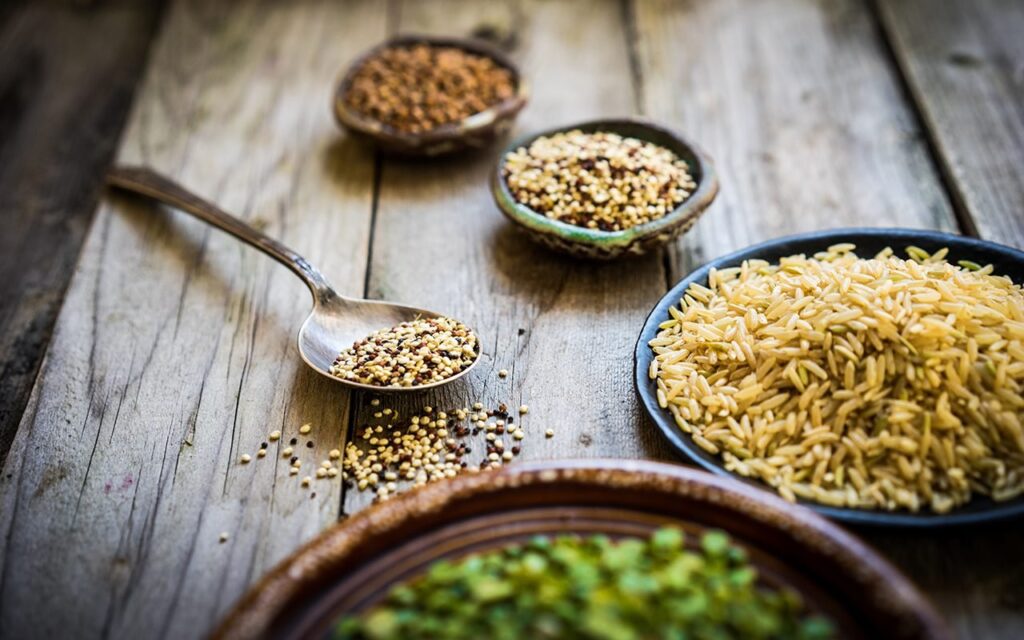In the fast-paced world we live in, maintaining a strong immune system and high energy levels is crucial for staying healthy and productive. Whether it’s dealing with work stress, staying active, or combating seasonal illnesses, the food we eat plays a significant role in determining how our bodies function. What we consume on a daily basis can either fuel or deplete our energy reserves, influence our immune response, and support our overall well-being.
In this article, we’ll explore the best healthy foods to boost your energy and immunity, helping you make more informed choices when it comes to your diet. We will cover essential nutrients, foods to include in your meals, and why these foods are so important for your energy and immune health.
Key Takeaways
- Consuming nutrient-dense foods such as leafy greens, berries, citrus fruits, and lean proteins can boost both energy and immunity.
- Vitamins and minerals like vitamin C, vitamin D, and zinc play a vital role in immune function and energy production.
- Fermented foods like yogurt and kefir support a healthy gut, which is essential for immune health and energy levels.
- A balanced, whole-food-based diet provides sustained energy and helps prevent fatigue and illness.
Understanding the Role of Nutrition in Energy and Immunity
Before we dive into the best foods for boosting energy and immunity, it’s important to understand how nutrition influences these areas of our health. Nutrition directly impacts several bodily functions, including metabolism, immune cell production, and energy release.
- Energy: Our bodies rely on the food we eat for energy. The key nutrients that fuel our bodies include carbohydrates, fats, and proteins. However, it’s not just about quantity—quality matters too. Whole foods that are rich in vitamins, minerals, and fiber provide a steady source of energy throughout the day, helping to avoid the energy crashes that come from highly processed, sugary foods.
- Immunity: The immune system depends on a variety of vitamins, minerals, and antioxidants to function optimally. Vitamin C, vitamin D, zinc, and selenium are among the most essential nutrients for maintaining a strong immune system. Foods that are rich in these nutrients help the body fight off infections and stay healthy during cold and flu season.
By incorporating a variety of nutrient-dense foods into your diet, you can help your body perform at its best and protect against illness.
The Best Healthy Foods to Boost Your Energy and Immunity
Leafy Greens: Spinach, Kale, and Swiss Chard
Leafy greens are some of the most nutrient-dense foods you can eat. They are loaded with vitamins, minerals, fiber, and antioxidants. Kale, spinach, and Swiss chard, in particular, are packed with vitamin C, which is essential for immune health. They also contain magnesium, which helps with energy production by supporting healthy muscle function and reducing fatigue.
These greens also provide folate, a B vitamin that plays a vital role in red blood cell production. Healthy red blood cells are essential for transporting oxygen throughout your body, which is directly linked to your energy levels. Adding leafy greens to your diet can be as simple as tossing them into a salad, blending them into a smoothie, or adding them to soups and stews.
Berries: Blueberries, Strawberries, and Raspberries

Berries are rich in antioxidants, which help to fight free radicals and reduce oxidative stress in the body. Blueberries, strawberries, and raspberries contain high levels of vitamin C and anthocyanins, compounds that can boost immune function and improve energy levels by reducing inflammation.
In addition to supporting immunity, berries are also low in sugar and high in fiber, making them a perfect addition to a balanced diet. They are easy to incorporate into your meals, whether in smoothies, yogurt, or oatmeal.
Citrus Fruits: Oranges, Lemons, and Grapefruits
Citrus fruits are famous for their high vitamin C content, an essential nutrient for boosting the immune system. Vitamin C helps stimulate the production of white blood cells, which are critical for fighting infections. Additionally, citrus fruits like oranges, grapefruits, and lemons are packed with fiber, which aids in digestion and helps maintain steady energy levels throughout the day.
You can enjoy citrus fruits fresh, as a juice (preferably with pulp), or add lemon to your water for a refreshing boost of vitamin C.
Nuts and Seeds: Almonds, Walnuts, and Chia Seeds
Nuts and seeds are packed with healthy fats, proteins, and essential vitamins and minerals that support both energy production and immunity. Almonds, for example, are a great source of vitamin E, a powerful antioxidant that helps protect immune cells from oxidative stress. Walnuts are rich in omega-3 fatty acids, which are known to reduce inflammation and support heart health.
Chia seeds, flaxseeds, and pumpkin seeds are also excellent sources of fiber and protein, making them great for sustained energy throughout the day. These nutrient-packed foods can be added to smoothies, yogurt, or enjoyed as a snack on their own.
Lean Proteins: Chicken, Turkey, and Fish
Protein is a building block for the body and plays an important role in immune function. Lean proteins, such as chicken, turkey, and fish (particularly salmon and tuna), provide amino acids that are necessary for the production of antibodies and other immune cells.
Salmon and other fatty fish are especially beneficial because they are rich in omega-3 fatty acids, which have anti-inflammatory properties that support immune health. Fish also contains vitamin D, which is essential for proper immune function, especially during the winter months when sunlight exposure is limited.
Whole Grains: Brown Rice, Quinoa, and Oats

Whole grains are a great source of complex carbohydrates, which provide a steady release of energy throughout the day. Brown rice, quinoa, and oats are particularly nutrient-dense and contain a variety of vitamins and minerals, including B vitamins, iron, and magnesium.
These grains are also rich in fiber, which helps maintain stable blood sugar levels and prevent energy crashes. Whole grains can help fuel your body for longer periods, ensuring sustained energy for both physical and mental activities.
Garlic and Ginger
Both garlic and ginger have long been praised for their immune-boosting properties. Garlic contains allicin, a compound that has been shown to have antibacterial and antiviral properties. It also helps to improve circulation and can enhance energy levels by reducing fatigue.
Ginger, on the other hand, has anti-inflammatory and antioxidant properties, which help to strengthen the immune system and improve energy flow throughout the body. Both of these ingredients can be easily added to your meals through cooking or by brewing them into teas.
Turmeric
Turmeric is a vibrant yellow spice that contains curcumin, a compound known for its anti-inflammatory and antioxidant properties. Curcumin helps to reduce inflammation in the body, which can improve overall immune function and increase energy levels. Studies have also shown that curcumin can enhance the body’s ability to fight infections.
You can add turmeric to soups, stews, smoothies, or even make a delicious golden milk by combining it with warm milk and honey.
Sweet Potatoes
Sweet potatoes are an excellent source of complex carbohydrates and fiber. They are rich in vitamin A, which is important for maintaining healthy skin and mucous membranes, the body’s first line of defense against infection. Additionally, the high fiber content of sweet potatoes helps maintain steady blood sugar levels and provides a steady source of energy throughout the day.
Sweet potatoes are incredibly versatile and can be roasted, mashed, or added to soups and stews.
Yogurt and Fermented Foods
Yogurt, kefir, sauerkraut, and other fermented foods are rich in probiotics, which are beneficial bacteria that help to maintain a healthy gut microbiome. A healthy gut is essential for proper immune function, as a large portion of the immune system resides in the digestive tract.
Incorporating fermented foods into your diet can help boost your immunity, improve digestion, and enhance energy levels. Choose unsweetened yogurt for a lower-sugar option, or add fermented vegetables to salads and sandwiches.
Also Read: Understanding Health Grades: Key Metrics For Better Wellness Decisions
Conclusion
Eating for wellness is not just about selecting the right foods for energy and immunity; it’s about understanding how food impacts your overall health. The foods you eat directly affect your body’s ability to fight off infections, produce energy, and function optimally. By incorporating nutrient-dense, whole foods such as leafy greens, citrus fruits, lean proteins, and healthy fats into your diet, you can help your body thrive.
FAQs
How do healthy foods boost immunity?
Healthy foods provide essential nutrients like vitamins and minerals that support the immune system. Nutrients such as vitamin C, zinc, and vitamin D help stimulate immune cells and protect against infections.
What is the best food for boosting energy?
Foods rich in complex carbohydrates, healthy fats, and proteins, such as whole grains, lean meats, and nuts, are the best for providing sustained energy. They release energy slowly, preventing spikes and crashes in blood sugar levels.
Can I boost my immunity with supplements instead of food?
While supplements can be helpful in certain situations, it’s always better to get your nutrients from whole foods. Whole foods provide a wide range of vitamins, minerals, and antioxidants that work synergistically to support overall health.
How can I incorporate these foods into my diet?
These foods can be added to your meals in many ways. Add leafy greens to salads and smoothies, enjoy berries as snacks, include citrus fruits in your morning routine, and cook with garlic, ginger, and turmeric for added flavor and health benefits.
Are there any foods that negatively impact immunity?
Highly processed foods, sugary snacks, and excessive alcohol can weaken the immune system and reduce energy levels. These foods can lead to inflammation and blood sugar spikes, which can impair immune function.
How can I ensure I’m getting enough energy throughout the day?
To maintain energy, eat a balanced diet that includes complex carbs, lean proteins, healthy fats, and fiber. Focus on whole, unprocessed foods to avoid blood sugar crashes and fatigue.
Is it better to eat smaller meals throughout the day for energy?
Yes, eating smaller, balanced meals every few hours can help maintain steady blood sugar levels and provide consistent energy. Avoid large, heavy meals that can make you feel sluggish.

